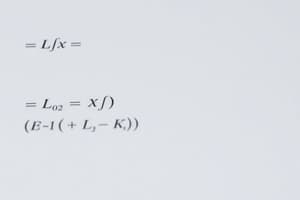Podcast
Questions and Answers
What is the primary purpose of differentiation in calculus?
What is the primary purpose of differentiation in calculus?
- To find the original function from its derivative
- To determine the behavior of functions under various operations (correct)
- To calculate the area under a curve
- To solve problems related to motion and heat transfer
Which technique is commonly used in integration to transform the integrand?
Which technique is commonly used in integration to transform the integrand?
- The power rule
- The product rule
- The quotient rule
- The method of substitution (correct)
What is the inverse operation of differentiation?
What is the inverse operation of differentiation?
- Finding the slope of a curve
- Integration (correct)
- Calculating the maximum or minimum of a function
- Substitution
How does calculus contribute to the field of engineering?
How does calculus contribute to the field of engineering?
What is a key application of calculus in computer science?
What is a key application of calculus in computer science?
How does calculus contribute to the field of economics?
How does calculus contribute to the field of economics?
What is the primary focus of differential calculus?
What is the primary focus of differential calculus?
Which of the following is NOT an application of calculus?
Which of the following is NOT an application of calculus?
How is the limit of a function $f(x)$ as $x$ approaches $a$ symbolically represented?
How is the limit of a function $f(x)$ as $x$ approaches $a$ symbolically represented?
What is the relationship between the derivative of position and velocity?
What is the relationship between the derivative of position and velocity?
Which of the following is a fundamental concept in integral calculus?
Which of the following is a fundamental concept in integral calculus?
How does calculus contribute to the field of computer science?
How does calculus contribute to the field of computer science?
Flashcards are hidden until you start studying
Study Notes
Calculus
Calculus is one of the most fundamental branches of mathematics. It deals with rates of change and accumulation, which has led it to play an essential role in many fields such as physics, engineering, economics, and computer science. This branch of mathematics can be divided into two main parts: differential calculus and integral calculus. Each part focuses on specific concepts within calculus: limits, derivatives, differentiation, integration, and their applications.
Limits
In calculus, the concept of limit defines how close a function comes to certain values as its input approaches some value. Informally, if f(x) denotes the output of a function when the input x takes a particular value, then we say that the limit of f(x) as x approaches a is L, written as lim x→a f(x)=L, if no matter how closely x approaches a, f(x) is always arbitrarily close to L.
Derivatives
A derivative is a measure of how much a quantity changes over time or how sensitive a quantity is to change. Mathematically speaking, it is the slope of a curve at any given point. Differentiations are used to define the rate at which quantities change with respect to each other. For instance, the derivative of position with respect to time gives velocity, while the derivative of velocity with respect to time gives acceleration.
Differentiation
Differentiation is the process of finding the derivative of a function, which involves using various techniques like the power rule, product rule, quotient rule, etc., to determine the behavior of functions under certain operations, such as adding, subtracting, multiplying, dividing, and composing them. These rules allow us to find the equation of tangent lines to graphs of functions, calculate slopes of curves, and determine maximums and minimums of functions.
Integration
Integration is the inverse operation of differentiation. It allows us to reconstruct the original function from its derivative by either summing up infinitesimal changes in the variable or by reversing the differentiation process. One common integration technique is the method of substitution, where the integrand is transformed by replacing a variable with another expression involving only the independent variable and constants. An important application of integration is solving problems related to motion, work, and area under a curve.
Applications of Calculus
Physics
Calculus plays a crucial role in understanding physical phenomena, such as motion, heat transfer, electricity, sound wave propagation, fluid flow, and electromagnetism. Mathematical tools derived from calculus provide insight into these complex systems and help create accurate models for predicting real-world behaviors.
Engineering
Engineering utilizes calculus extensively to model, analyze, design, and optimize various structures and systems. For example, structural analysis relies on principles of statics, dynamics, and elasticity to ensure safety and efficiency of buildings and bridges; control systems involve calculating trajectories and optimal solutions for vehicles and machines; and optimization techniques based on gradient methods and Lagrange multipliers help engineers make strategic decisions.
Economics
Calculus enables economists to develop models that explore relationships between economic variables, such as supply, demand, prices, wages, interest rates, inflation, and labor markets. By analyzing these models mathematically, economists can gain insights into market trends, consumer preferences, producer behavior, and welfare effects.
Computer Science
Computer scientists use calculus in machine learning algorithms, artificial intelligence systems, and image processing techniques to solve optimization problems, compute gradients, and perform linear algebra computations. Gradient descent, backpropagation, and neural networks rely heavily on calculus to minimize loss functions and train deep learning models.
Studying That Suits You
Use AI to generate personalized quizzes and flashcards to suit your learning preferences.




